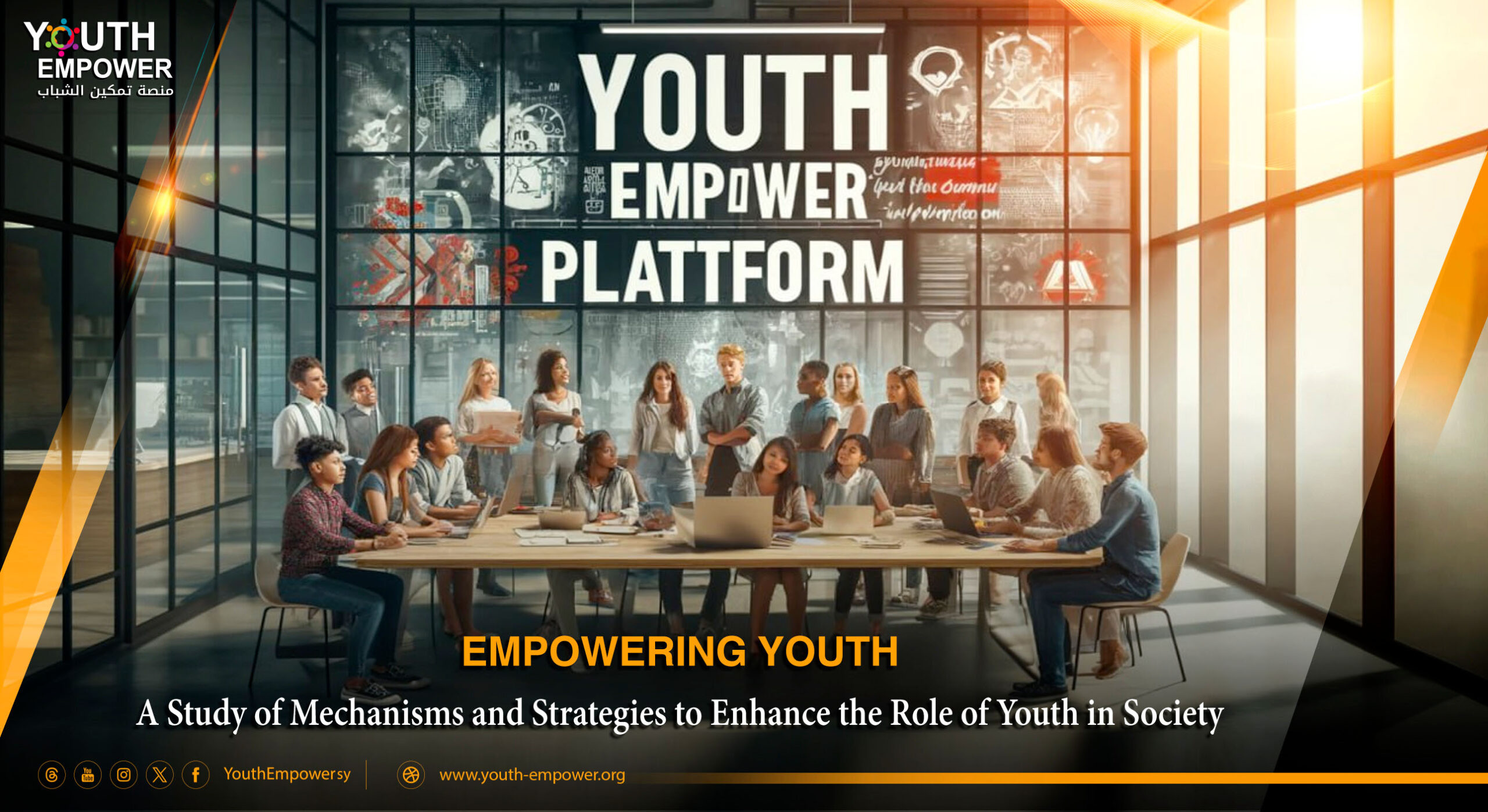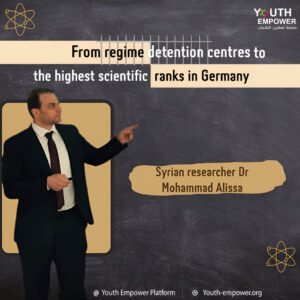Youth Empowerment : A Study of Mechanisms and Strategies to Enhance the Role of Youth in Society
In its ongoing commitment to supporting and developing the capabilities of youth, the Youth Empower Platform is enhancing the understanding of the challenges and opportunities facing Syrian youth.
As a specialized initiative in youth empowerment, the platform focuses its efforts on analyzing the current situation of youth and offering innovative solutions that contribute to their more effective integration into society.
Through its studies and implemented projects, the platform aims to accurately depict the social, political, and various influences that shape the experiences of youth in Syria and identify ways to empower this vital segment of the community.
Research Methodology:
To achieve this objective, the platform has adopted a comprehensive research methodology that includes designing and distributing detailed surveys, conducting in-depth interviews with diverse groups of youth, and organizing focus group sessions to collect rich and varied data.
These tools have enabled the research team at the platform to compile a wide array of opinions and experiences that reflect the living conditions of youth in Syria, taking into account geographical distribution and cultural and social diversity.
The surveys were distributed electronically via the platform’s official website and social media networks to ensure the widest possible reach.
Responses were received and analyzed using advanced data analysis software to ensure accuracy and objectivity of the results.
Transitioning to the Study:
“With a solid foundation of data and information, this study delves into a detailed analysis of that data to extract a precise understanding of what youth empowerment means from their own perspective, the barriers that prevent this empowerment, and the strategies that can effectively and fairly support them.“
Given the challenges faced by Syrian youth, including marginalization and exclusion at various levels, this study provides a comprehensive analysis aimed at enhancing understanding of the current situation and preparing the groundwork for future initiatives that take into account the voices and aspirations of the youth.
By analyzing the collected data and presenting evidence-based recommendations, the platform seeks to pave the way for adopting policies and practices that serve the interests of the youth and support their active contribution to building a balanced and prosperous society.
With this comprehensive and methodical approach, the study now moves towards a detailed analysis of the collected data, outlining challenges and opportunities in a way that reflects the reality experienced by Syrian youth, and proposing realistic ways to overcome these challenges and achieve genuine empowerment for them.
Defining Youth Empowerment and Its Importance:
What does the term “youth empowerment” mean?
The term “youth empowerment” reflects a variety of goals and actions aimed at enhancing the capabilities of youth and their participation in society.
This term can be understood by analyzing the responses to a survey where participants identified several key aspects of youth empowerment.
Data shows that 39.53% of participants consider encouraging and supporting youth to take a more active role in their communities as the most important aspect of youth empowerment.
This reflects a desire to see youth as active and influential elements in the development of their communities.
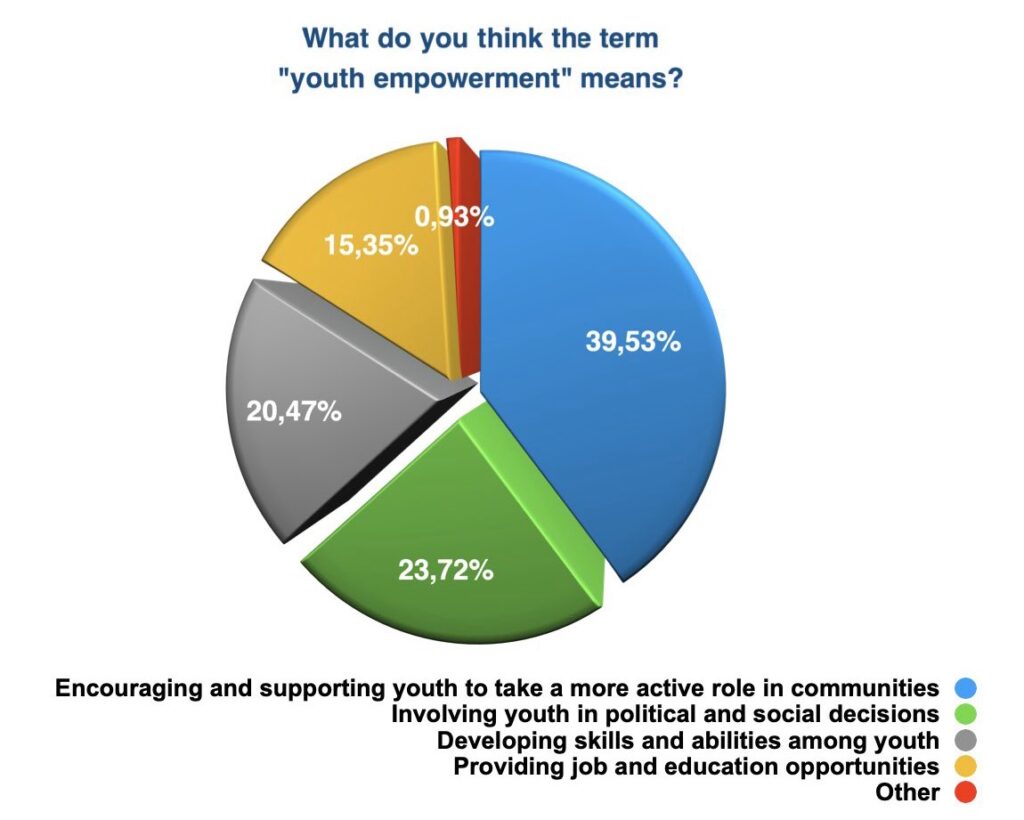
In second place, 23.72% of participants believe that involving youth in political and social decisions is a crucial aspect of their empowerment.
This percentage reflects the recognition of the importance of youth participation in the democratic process and decision-making that affects their future.
Developing skills and abilities among youth comes as the third most important aspect, with 20.47%, underscoring the need to provide training and education that enables youth to efficiently face future challenges.
Finally, 15.35% of participants consider providing job and educational opportunities as an integral part of empowering youth, indicating a close link between economic independence and effective empowerment.
A mere 0.93% of participants chose “other,” indicating that the mentioned aspects largely cover the general perception of what youth empowerment means in the current context.
“These data provide a deep understanding of how society views the term youth empowerment and the priorities that should be focused on to ensure the greatest positive impact on their lives and futures.“
The Importance of Youth in Society:
Youth are considered a crucial and fundamental element in shaping the future of societies.
A survey addressing the importance of this demographic in society shows that a vast majority, 78.30%, view youth as a primary driver of development and innovation.
This high percentage reflects a broad recognition of the role that youth play in advancing progress and creativity, emphasizing the need to provide them with support and opportunities to contribute more effectively to society.
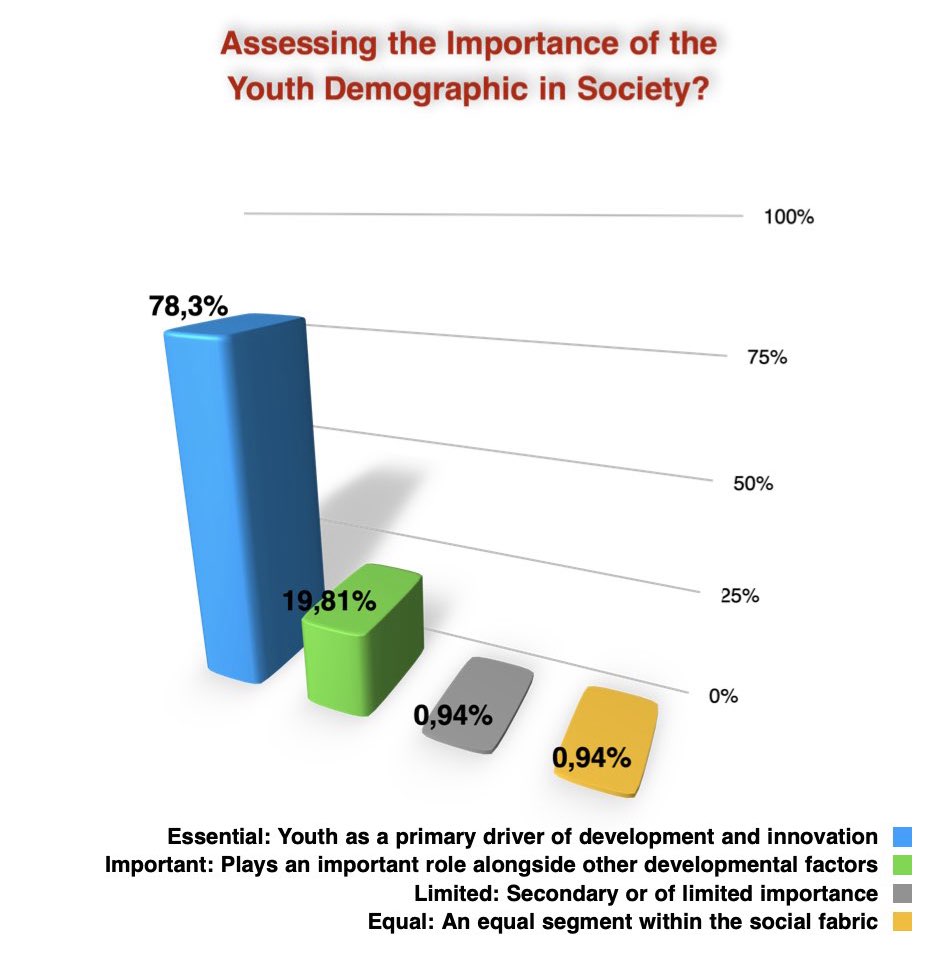
On the other hand, 19.81% of participants believe that youth play an important role, but it is alongside other developmental factors.
This opinion reflects a more balanced viewpoint that recognizes the importance of youth but in the context of interaction with other age groups and multiple factors within society.
The smaller percentages, which amount to 0.94% for each of the opinions that describe the role of youth as limited or consider them an equal segment within the social fabric, suggest a belief that youth can have a secondary role or that their contributions are equivalent to those of other age groups without distinction.
These results underscore the significant recognition of youth as an active and powerful element in society, supporting the need to focus efforts on empowering them and enhancing their capabilities not only for achieving growth and development but also to ensure the sustainability of these processes across generations.
The Primary Goal of Youth Empowerment:
The primary goal of youth empowerment encompasses several interconnected dimensions primarily focused on enhancing community and political participation, supporting economic growth and innovation, and developing individual and professional capabilities.
According to survey data, 37.06% of participants see enhancing community and political participation as the fundamental goal of youth empowerment.
This reflects the belief in the importance of youth taking on civic and political responsibilities and contributing to decision-making processes that impact their communities.
Additionally, 34.71% of participants view supporting economic growth and innovation as the main goal for empowering youth.
This perspective is based on the significant role youth can play in driving the economy and enhancing innovation across various sectors through the introduction of new ideas and adoption of advanced technologies.
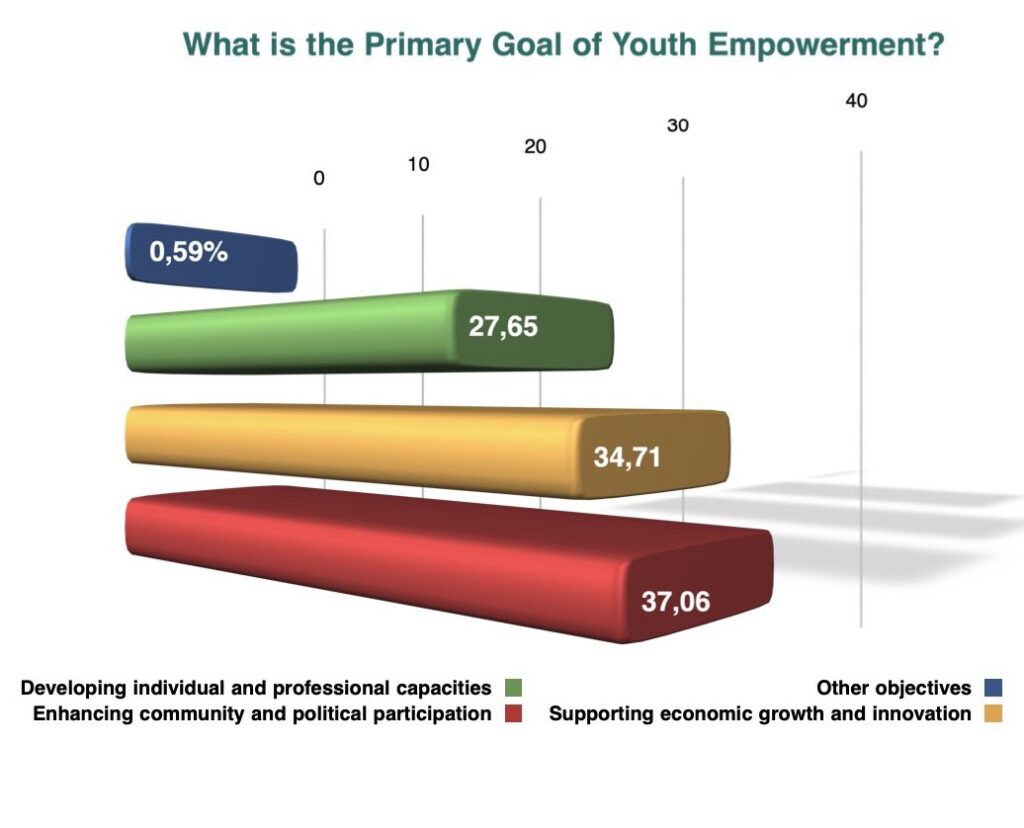
Developing individual and professional capabilities ranks third with 27.65%, highlighting the focus on improving youth’s individual skills through education and vocational training, enabling them to achieve their personal and professional goals and contribute effectively to society.
Finally, the remaining 0.59% indicate other goals, reflecting the diversity of views on potential other objectives for empowering youth which may include promoting social peace, supporting cultural and social integration, or enhancing self-autonomy.
“These data broadly acknowledge the importance and role of youth in various aspects of social and economic development, underscoring the urgent need to enhance their empowerment to achieve a positive and sustainable impact in society.“
In conclusion, this section, which dealt with defining youth empowerment and its importance, demonstrates a broad consensus on the multiple roles that youth can play in society.
The data extracted from the surveys indicate that the vast majority view youth as a primary force for development and innovation, with significant emphasis on enhancing their community and political participation as a key goal of empowerment.
There is also a notable appreciation for the importance of supporting economic growth and developing individual and professional capacities for youth.
“These results underline the crucial need for effectively involving youth in all aspects of community and economic life to ensure the achievement of sustainable and inclusive development that serves both current and future generations.“
Fields and Means of Youth Empowerment:
Which fields help empower youth?
The fields and means of youth empowerment are crucial for developing their abilities and preparing them to play an effective role in society.
A survey conducted by the platform reveals that education and vocational training are the most prominent fields for youth empowerment, with 37.85% of participants emphasizing the importance of this area for building a solid foundation that enables them to compete in the job market and professional life.
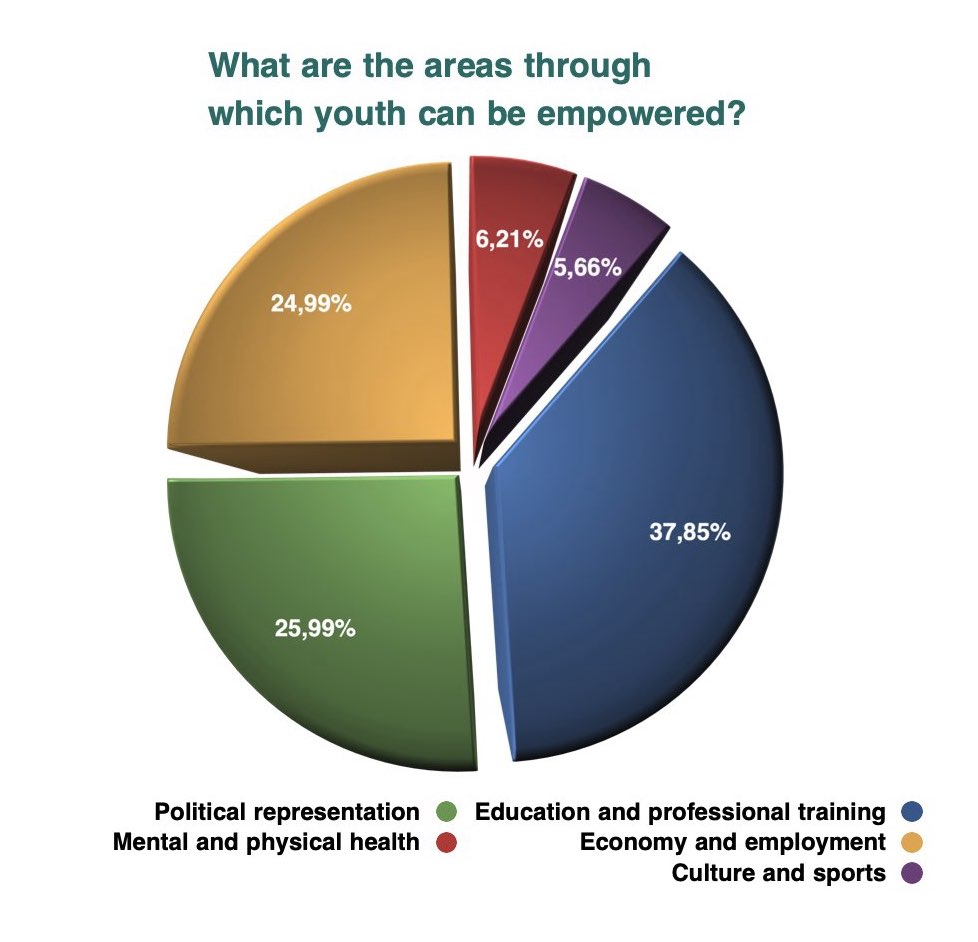
Political representation came in second with 25.99%, indicating the urgent need to involve youth in political processes and ensure their representation in decision-making structures.
Economics and employment are also key areas, with 24.29%, reflecting the belief that improving job opportunities and economic growth is a fundamental pillar for empowering youth.
Although mental and physical health, culture, and sports have relatively lower percentages, they play an important role in providing a comprehensive foundation for personal and collective development of youth, with percentages of 6.21% and 5.66% respectively.
“These results reinforce the understanding that empowering youth must encompass several interactive areas to ensure their personal, professional, and social growth, enabling them to effectively contribute to building their communities.“
Enhancing Youth Participation and Representation:
Enhancing youth participation and ensuring their effective and balanced representation requires focusing on multiple key sectors, as survey results indicate.
The sector deemed most important by participants is governance and politics, with 33.15% of participants emphasizing the need to concentrate efforts in this sector to reduce the exclusion of youth. This reflects the necessity to boost youth involvement in political processes and representation in governmental structures.
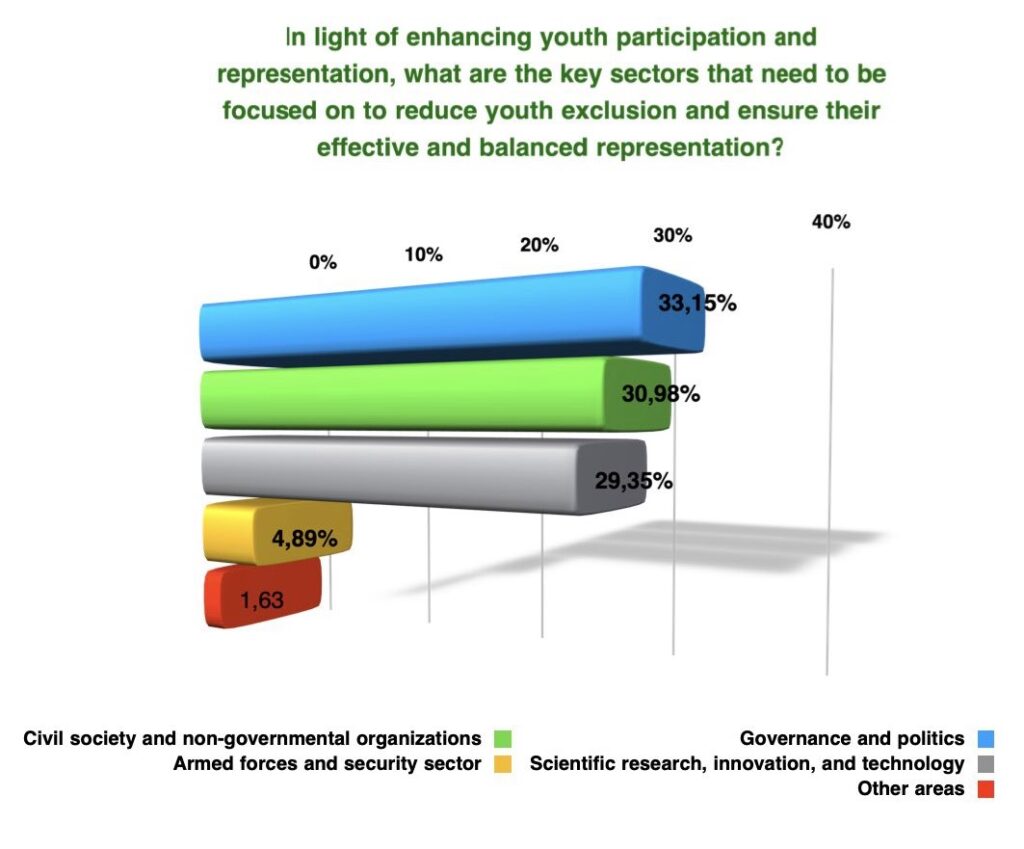
Civil society and non-governmental organizations come in second at 30.98%, indicating the importance of these sectors as platforms for empowering youth and engaging them in civil affairs to promote democracy and sustainable development.
Scientific research, innovation, and technology are other vital sectors that have been focused on, with a representation of 29.35%, to ensure the empowerment and participation of youth. This highlights the role youth can play in driving innovation and developing technologies that benefit society as a whole.
The armed forces and security sector attracted less interest from participants, accounting for only 4.89%, but it is still considered an important area for affirming the presence of youth in vital fields related to national security.
Finally, 1.63% of the participants pointed to other unspecified areas, reflecting the diversity in opportunities available for empowering youth and enhancing their representation.
“These results show clear priorities and underscore the urgent need for strategic interventions to enhance youth participation in all aspects of society.“
Role of Youth in Social and Political Development
The section addressing the role of youth in social and political development was a key question in the survey published by the Youth Empower Platform on its website, concerning the need to empower youth in Syrian society.
The survey results reveal a broad consensus on the importance of this issue.
With a high rate of 96%, participants answered “yes,” affirming that empowering youth is an urgent necessity for Syrian society.
This outcome reflects widespread recognition of the importance of youth’s role in social and political development and indicates a strong desire to support and enhance the capabilities of youth to be tomorrow’s leaders and drivers of positive change in Syria.
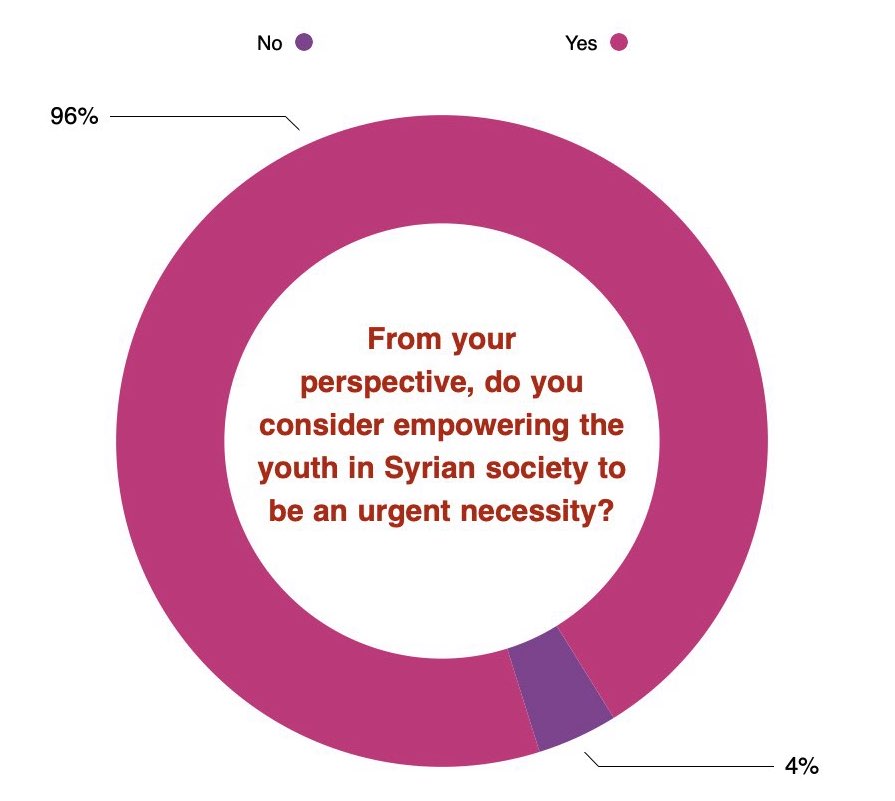
On the other hand, the small percentage that said “no,” representing 4%, may express viewpoints that there are other priorities, perhaps more immediate or skeptical of the current methods of youth empowerment.
“Nevertheless, the overwhelming majority serves as a strong indicator of the need for substantial support for empowering youth in Syria, emphasizing the importance of focusing developmental policies and programs on this vital age group.“
Contribution of Youth in Making a Qualitative Leap in Society
In light of analyzing the role of youth in social and political development, a survey published on the Youth Empower Platform posed two important questions about the contribution of empowering youth to the development and building of society.
The first question relates to whether empowering youth contributes to the development and building of society, where the results showed complete support with 100% of participants affirming the importance of empowering youth in this aspect.
This reflects a firm belief that youth represent a driving force for social progress and development.
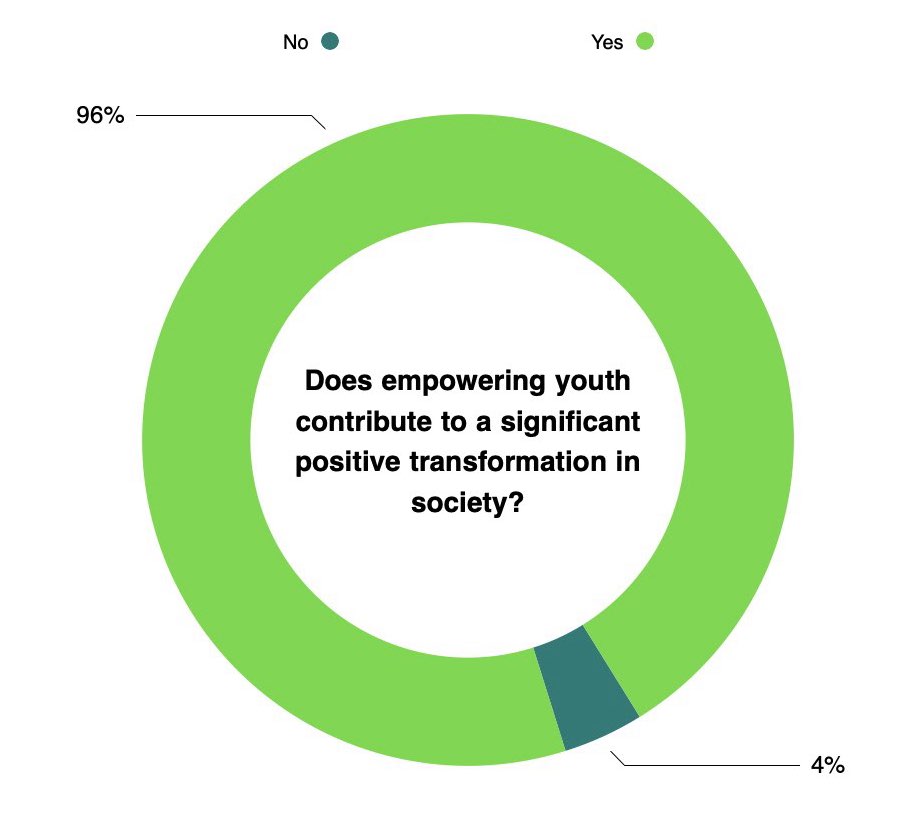
The second question delves into whether empowering youth contributes to creating a positive qualitative leap in society.
Here, 94% of participants responded affirmatively, underscoring the vital role that youth play in stimulating positive and sustainable changes within communities.
This percentage indicates a high appreciation for the potential of youth in driving social and economic transformation.
On the other hand, only 6% expressed an opposing view, indicating some limited reservations about the overall impact of youth empowerment.
“Therefore, these data strongly confirm the belief that empowering youth not only contributes to developing social and economic structures but is also essential for initiating qualitative transformations that enhance the community’s capacity for innovation and renewal.
Providing opportunities and resources necessary for empowering youth can lead to the optimal utilization of their energies and potentials, ensuring the progress and prosperity of societies in the future.“
Alignment of Youth Empowerment with the Current Syrian Reality:
In assessing how well the concept of youth empowerment aligns with the current Syrian reality, survey results indicate a divergence of opinions among participants.
A majority of the responses, at 51.40%, consider youth empowerment fully compatible and necessary for the Syrian context, reflecting an awareness of the importance of youth’s role in the rebuilding and development process, especially given the current challenges.

On the other hand, 21.50% of participants believe that the idea of empowering youth does not align with the Syrian reality, which may reflect structural or social obstacles that limit the effectiveness or feasibility of fully implementing such programs under current conditions.
The percentage that sees the idea as somewhat compatible amounts to 17.76%.
These views may indicate that there are both successes and challenges in applying youth empowerment concepts in the Syrian context, suggesting that progress is being made, but there is still much to be achieved.
Finally, 9.35% of participants express a lack of sufficient information to assess the alignment between youth empowerment and the Syrian reality, reflecting a need to increase awareness and information about the importance and impact of these initiatives.
These data provide insight into the appreciation for the importance of youth empowerment in Syria and reflect the challenges faced in effectively implementing this concept.
Youth remain a vital element in any developmental and rebuilding process, and enhancing their role and empowering them is a necessary step towards achieving a stable and prosperous future.
Challenges and Difficulties Facing Youth:
In the section addressing the challenges and difficulties facing the youth in their communities, the survey conducted by the Youth Empower Platform identifies a set of major obstacles that prevent youth from realizing their full potential.
The most prominent of these challenges is unemployment and the lack of job opportunities, with 37.5% of participants indicating that this is the most pressing issue.
This reflects the economic crisis that directly affects the youth’s opportunities for stable and productive employment.
The second biggest challenge is political or social instability, voted by 29.74% of participants.
This factor complicates the environment in which young people work and live, limiting their ability to plan for a secure future or participate effectively in the development of their communities.
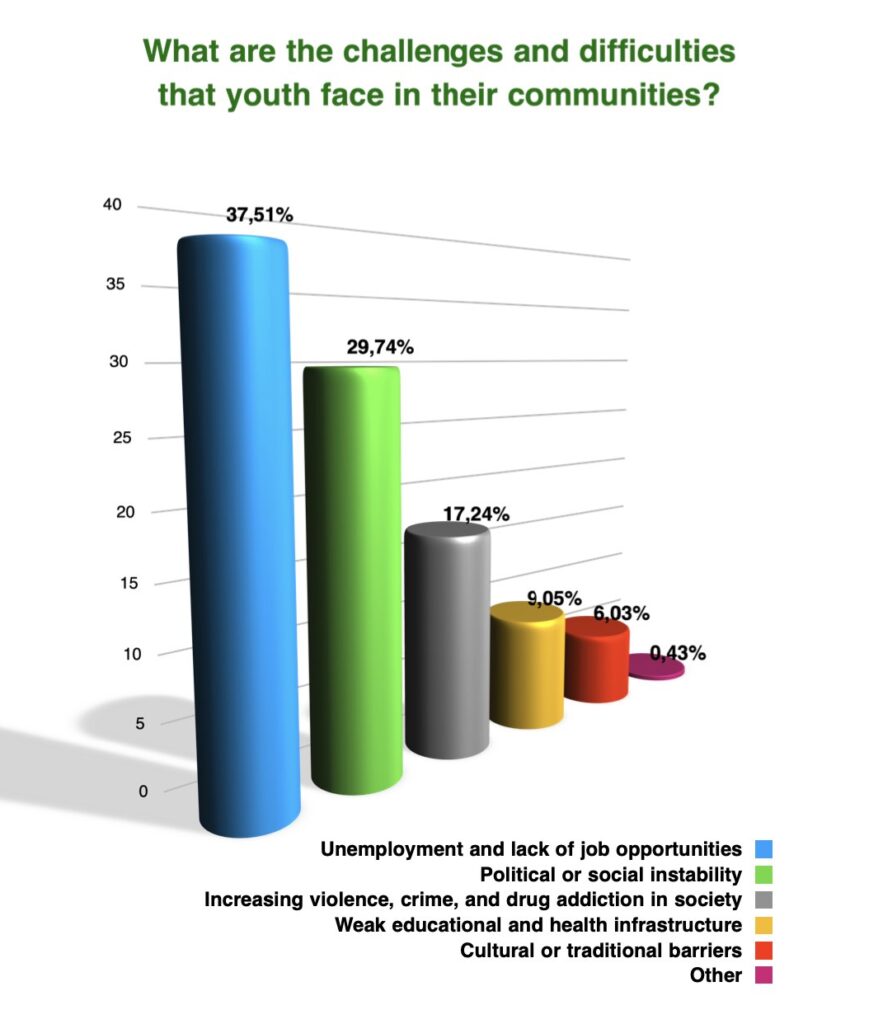
Increasing violence, crime, and drug addiction is another significant challenge, with 17.24%, emphasizing the need for a safe and stable environment for the growth and development of youth.
Weak educational and health infrastructure follows with 9.05%, indicating a deficiency in the basic services that enhance the capabilities and general health of youth.
Cultural or traditional barriers are also considered an obstacle by 6.03%, reflecting challenges related to cultural heritage that may limit the progress of youth or their innovative and diverse interaction in their communities.
Lastly, other unspecified challenges represent 0.43%, indicating the presence of other limited-mention challenges.
“These results highlight the diverse challenges facing youth and underscore the urgent need for robust strategies and policies to empower youth, focusing on improving economic, social, and cultural conditions to ensure their full and effective participation in society.“
Current Social Environment and the Support and Development of Youth:
Regarding the assessment of the current social environment and its suitability for supporting and developing the youth in Syria, the survey shows that opinions are significantly divided.
According to the survey, 50% of participants believe that the current social environment does not effectively support the development of youth, reflecting the presence of significant challenges that hinder the progress of youth and their active role in society.
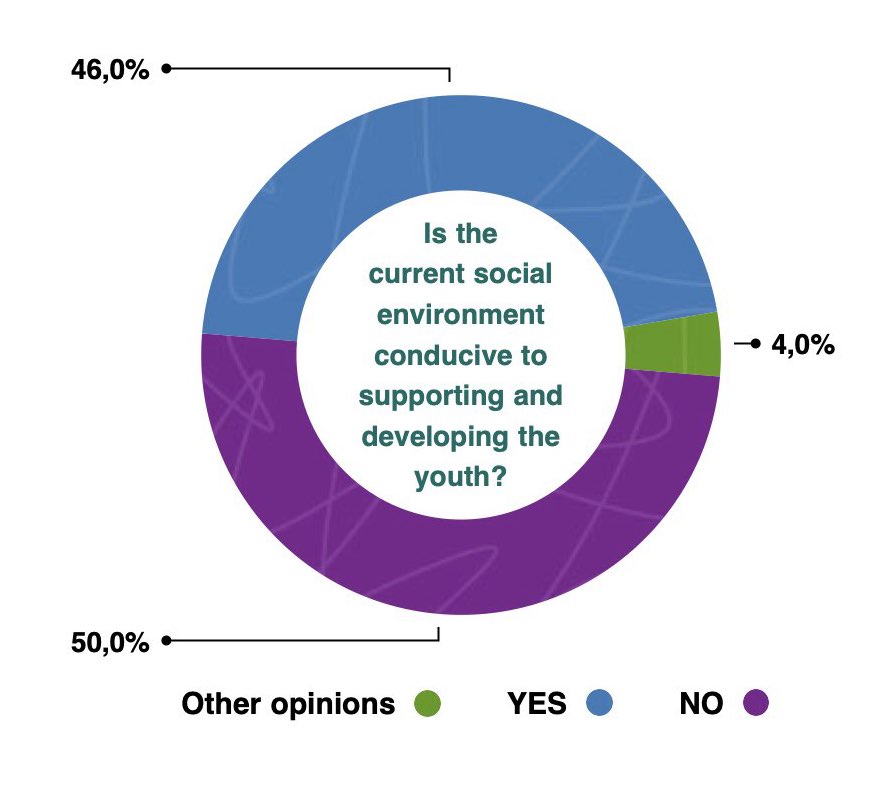
On the other hand, 46% of participants feel that the social environment is somewhat conducive to supporting and developing youth, suggesting the existence of some initiatives or programs that contribute to empowering youth. However, these may have limited impact or may not be sufficient to meet the full needs of the youth.
The remaining 4% of opinions indicate multiple complexities in the social environment, including significant disparities in youth support by region, and differences in customs and traditions that may negatively affect the role of youth, particularly women, in society.
Migration, especially among males, is noted as an indicator of the environment’s failure to meet the needs of youth, leading to a loss of youthful energies that could contribute to the country’s development.
These data provide a deep understanding of the dilemmas facing youth in Syria and highlight the urgent need to establish a strong social and economic infrastructure that allows for effective and balanced empowerment of youth across the country.
Measures and Steps Towards Youth Empowerment
In this section discussing the measures and steps towards empowering youth, survey results identify the need for a variety of effective actions to support this vital segment of society.
The proposed steps range across legal, economic, educational, and health impacts, reflecting the need for a comprehensive approach to youth empowerment.
“Firstly, urging policymakers to enact laws that facilitate youth empowerment is considered a fundamental step,”
with 23.81% of participants highlighting the importance of youth-supportive legislation that guarantees their rights and opens up opportunities for more effective participation in public and economic life.
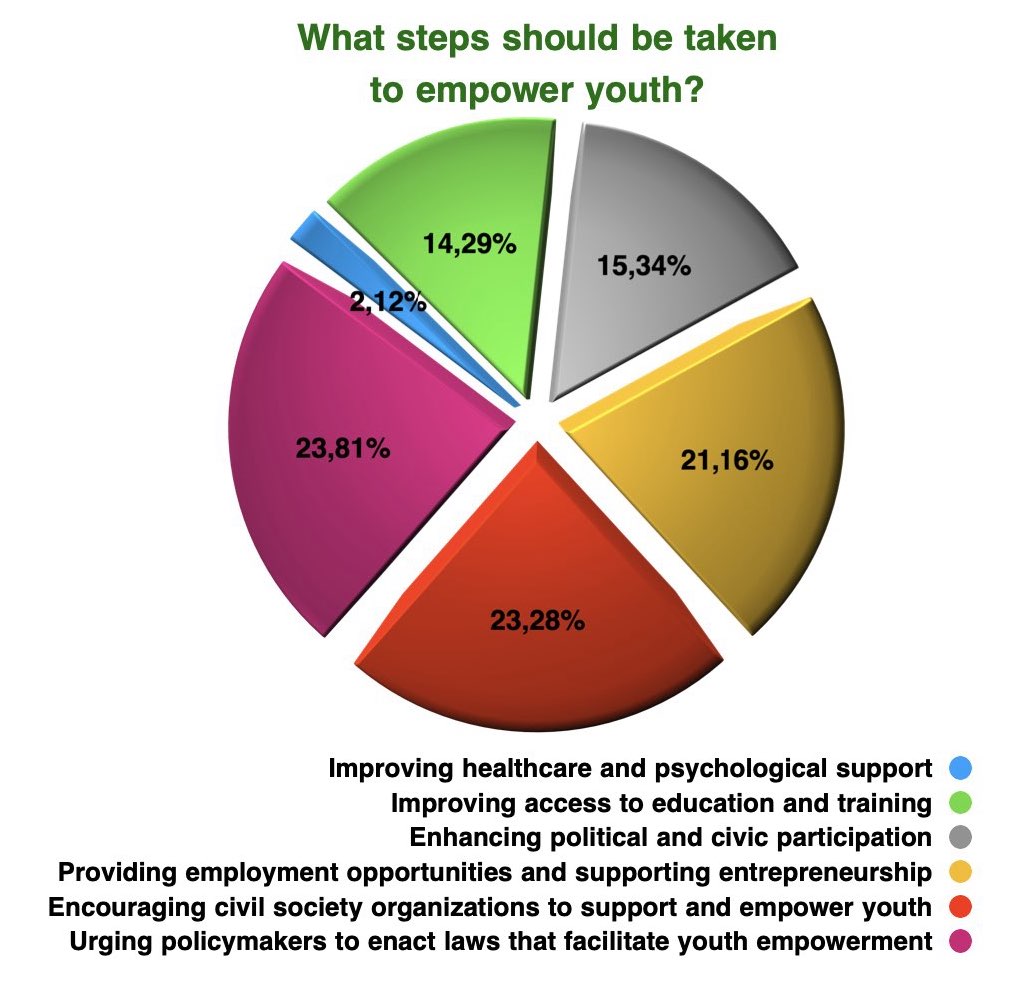
“Secondly, encouraging civil society organizations to support and empower youth,”
garnered 23.28% of participant opinions.
This indicates the significant role these organizations can play in providing the necessary support and resources for youth.
“Thirdly, providing job opportunities and supporting entrepreneurship is an important step emphasized by 21.16% of participants.“
Stimulating the economy and creating new job opportunities can improve the living conditions of youth and enhance their independence.
“Fourthly, enhancing political and civic participation should be a priority,”
voted by 15.34% of participants.
Active participation in democratic processes and community decisions enables youth to directly influence their future.
“Fifthly, improving access to education and specialized training as a crucial step,”supported by 14.29% of participants.
Investing in education enhances the capabilities of youth and equips them with the skills needed to compete in the job market.
“Finally, improving health services and psychological support is deemed essential,”
with 2.12% of participants supporting it. Good health is fundamental to ensuring that youth can effectively contribute to society.
“These results affirm that empowering youth requires multifaceted measures encompassing legal, economic, educational, and health aspects, to ensure the maximum benefit from the potential of this important segment in society.“
Providing Adequate Support for Youth
The survey results clearly reflect the majority view regarding the level of support provided to youth.
A significant 93% of participants believe that the support youth receive is insufficient, indicating a large gap between the actual needs of youth and the resources available to support them.
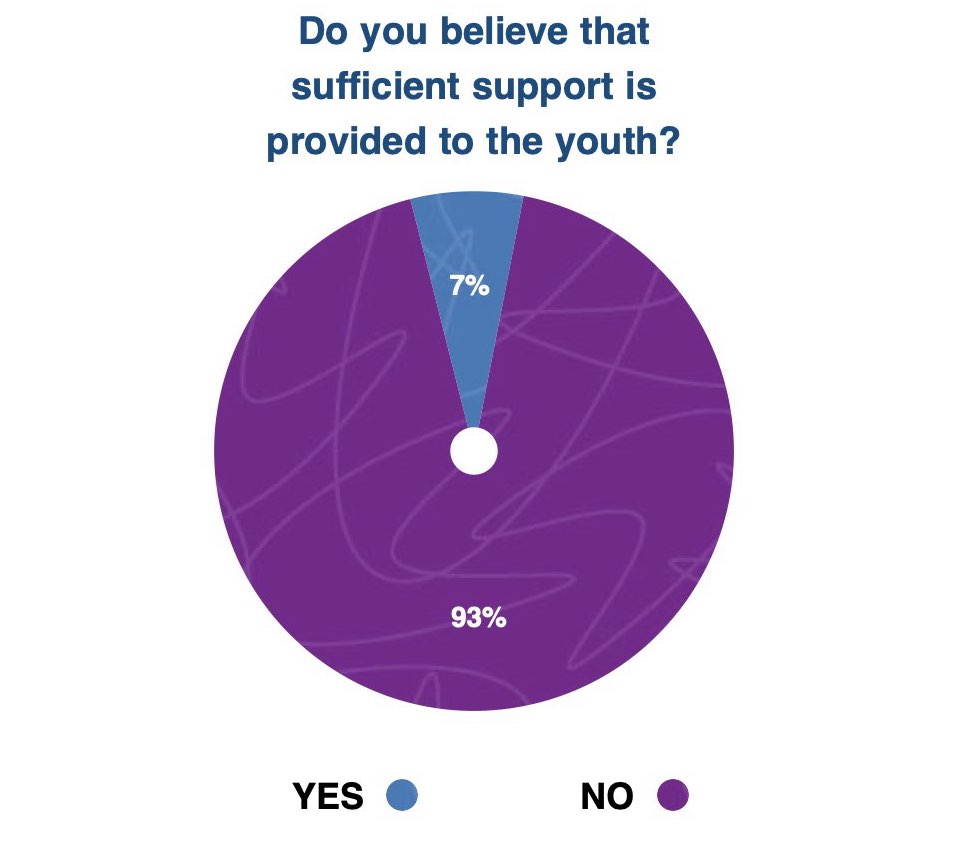
This high percentage suggests substantial challenges in the current support systems, which may include educational programs, economic opportunities, health services, psychological support, and participation in political and civic decision-making.
On the other hand, only 7% of participants feel that the support provided to youth is sufficient, reflecting the minority opinion that current programs and initiatives meet the basic needs of youth or are moving in the right direction to achieve this.
These results call for the necessity to review and enhance the measures and policies related to empowering youth and providing the necessary support, with particular focus on expanding programs that address key areas such as employment, education, health, and community and political engagement.
“Providing comprehensive and effective support for youth not only contributes to their personal advancement but also enhances their ability to make a positive contribution to society at large.“
Effective Youth Participation in Community and Public Activities:
The survey results indicate that youth participation in community and public activities remains a complex and opinion-divided issue. 50% of participants believe that youth are not effectively participating in these activities, reflecting significant challenges that prevent them from fully benefiting from the opportunities available to impact their communities.
Conversely, 45% of participants believe that youth are participating in these activities, suggesting that a segment of the youth is actively and effectively involved in social and public contributions, despite the mentioned difficulties and challenges.
For the remaining 5% of opinions, responses indicate specific barriers preventing more effective youth participation.
Some of these barriers include gender discrimination, differences in ideas and orientations within the youth community itself,
and social and political dominance by older generations, which may impose their vision and limit the active role of youth.
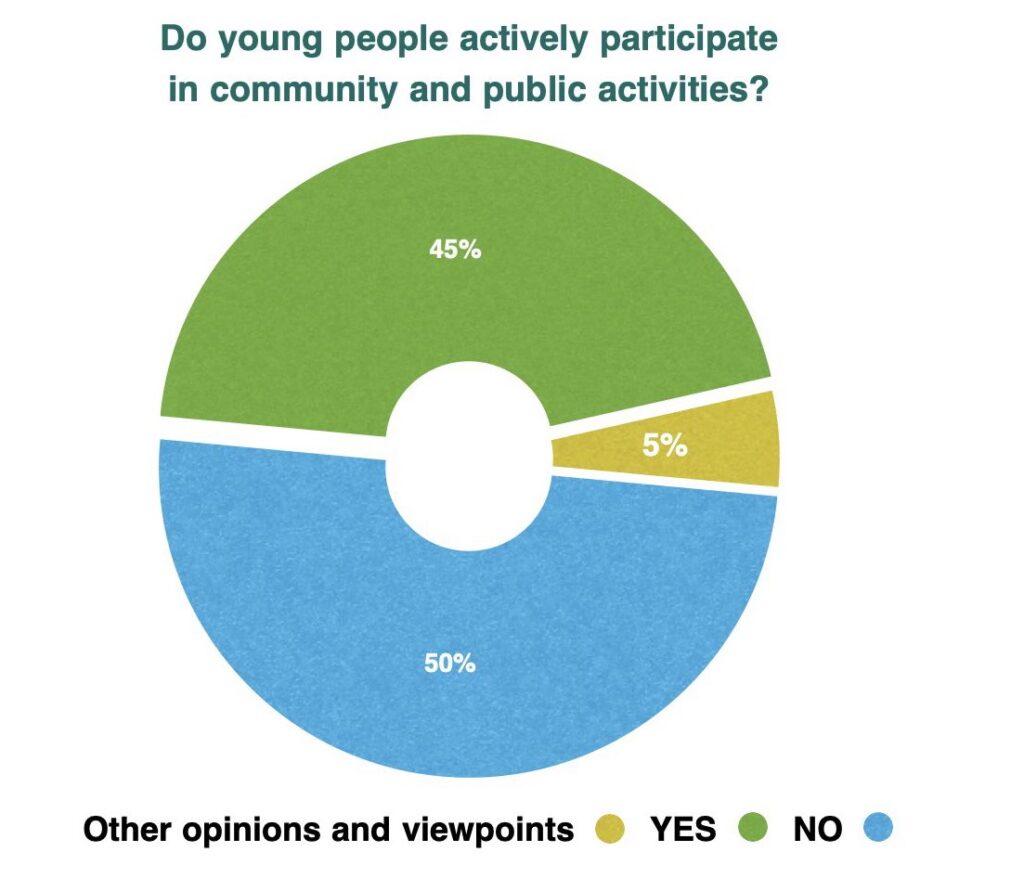
These opinions highlight the need to create supportive environments that enable youth to participate more effectively and provide them with platforms necessary for expressing their views and achieving their aspirations.
Removing barriers and challenges faced by youth and providing them with sufficient opportunities to influence political and social arenas can contribute to more effective and positive participation in developing their communities.
The Necessity of Incorporating Youth Empowerment Principles in Drafting the New Constitution
The final question underscores the importance of recognizing the role of youth in constitutional and legislative processes.
As the survey reveals a broad consensus among participants, with 95% supporting the need to consider principles of youth empowerment when drafting the new constitution.
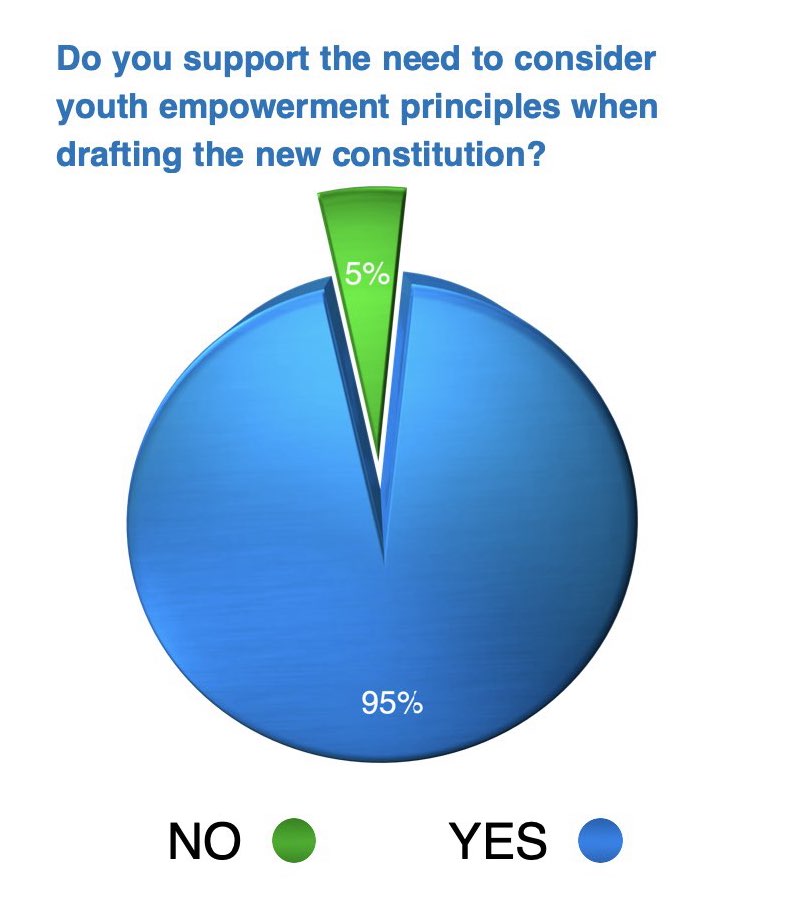
This reflects a strong desire to ensure that youth have a significant voice and active role in shaping the legal and political frameworks that will define the nation’s future.
The small minority, 5%, who oppose this view may represent traditional or conservative perspectives that prefer maintaining existing political and social models with minimal change, or they may express doubts about the youth’s ability to contribute effectively to this process.
“The strong call for including youth in the constitution-drafting process acknowledges that youth are not only the hope for a better future but also potentially active participants who can contribute innovative ideas and sustainable solutions to current challenges.
Empowering youth and engaging them effectively in drafting the constitution can enhance the legitimacy and effectiveness of the new constitutional document, contributing to social cohesion and the promotion of democratic governance.“
Results, Recommendations, and Future Vision:
In this study conducted by the Youth Empower Platform, the findings emphasize the importance of youth roles in developmental and political processes, as well as the difficulties and challenges they face in various social and economic contexts.
Our research, which explored the views and aspirations of youth, provides a detailed picture of the urgent need to involve them effectively and sustainably in decision-making and community development processes.
The effectiveness of youth empowerment depends on the implementation of a set of strategic recommendations focused on enhancing their participation in all aspects of social, economic, and political life.
Based on the findings of the study, the following recommendations can be offered:
First Recommendation – Urgent Need for Youth Empowerment:
“Youth represent the main engine for innovation and social and economic development.“
Support for developing training and educational programs that meet the requirements of the modern job market is vital, through initiatives aimed at creating new job opportunities and focusing on developing skills necessary for the digital age and innovation. Additionally, encouraging entrepreneurship among youth is essential.
Second Recommendation – Empowering Community and Political Participation:
“Significant challenges impede youth participation in community and political activities.“
Efforts should be made to stimulate youth to engage in democratic processes and community decisions through providing necessary training and guidance to enable them to play an active role.
Third Recommendation – Addressing Challenges and Obstacles:
Unemployment, lack of job opportunities, political or social instability, and the increase in violence, crime, and drug addiction are all challenges that prevent youth from achieving their full potential and contribute to lower rates of social and economic participation.
“Effective strategies must be put in place to address these challenges to achieve genuine and sustainable empowerment of youth.“
Fourth Recommendation – Necessity for Legal and Political Reforms:
It is recommended to urge policymakers to enact new laws and legislation that facilitate youth empowerment, including ensuring their involvement in drafting the new constitution to reflect their hopes and aspirations.
“This step reflects a strong desire to incorporate youth empowerment principles in key decision-making processes, ensuring comprehensive and effective participation.“
Fifth Recommendation – Increasing Comprehensive Support for Youth:
It is recommended to enhance the role of civil society organizations in supporting youth efforts by providing necessary resources, training, and platforms that enable them to achieve their goals and enhance their community participation.
Furthermore, it is crucial to improve access to education and health services, focusing on investing in high-quality vocational education and training, and enhancing critical and creative skills.
Expanding health services and providing psychological support for youth are essential to ensure good health that enables them to actively participate in community development.
“By implementing these recommendations, the Youth Empowerment Platform aims to open new horizons for youth and enhance their participation in building a better future for their communities.“
Future Vision of the Youth Empowerment Platform:
The Youth Empower Platform operates strategically and systematically towards achieving genuine and sustainable empowerment of youth, guided by a vision that places youth at the core of social and political development processes.
Based on United Nations Security Council Resolution 2250, which emphasizes the vital role of youth in enhancing global peace and security, the platform is committed to integrating youth into decision-making and enhancing their participation in democratic and political processes.
Implementing these recommendations requires concerted efforts from all stakeholders involved, including governments, non-governmental organizations, the private sector, and local communities.
Only through an integrated and sustainable approach can real and lasting empowerment of youth be achieved.
Follow us on social media:


